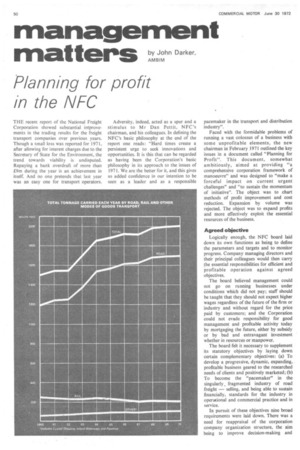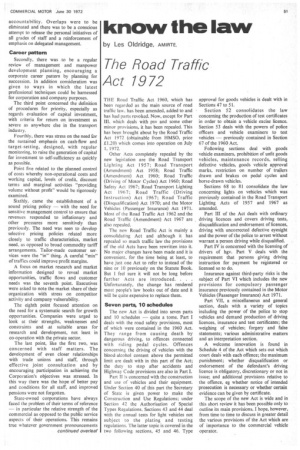management
Page 52

Page 53

If you've noticed an error in this article please click here to report it so we can fix it.
matters by John Darker
AMB M
Planning for profit in the NEC
THE recent report of the National Freight Corporation showed substantial improvements in the trading results for the freight transport companies over previous years. Though a small loss was reported for 1971, after allowing for interest charges due to the Secretary of State for the Environment, the trend towards viability is undisputed. Repaying a bank overdraft of more than £.9tn during the year is an achievement in itself. And no one pretends that last year was an easy one for transport operators. Adversity, indeed, acted as a spur and a stimulus to Mr Dan Pettit, NFC's chairman, and his colleagues. In defining the NFC's basic philosophy at the end of' the report one reads: "Hard times create a persistent urge to seek innovations and opportunities. It is this that can be regarded as having been the Corporation's basic philosophy in its approach to the issues of 1971. We are the better for it, and this gives us added confidence in our intention to be seen as a leader and as a responsible pacemaker in the transport and distribution industry".
Faced with the formidable problems of running a vast colossus of a business with some unprofitable elements, the new chairman in February 1971 outlined the key issues in a document called "Planning for Profit. This document, somewhat ambitiously, aimed at providing "a comprehensive corporation framework of manoeuvre" and was designed to "make a forceful impact on current urgent challenges" and "to sustain the momentum of initiative". The object was to chart methods of profit improvement and cost reduction. Expansion by volume was rejected. The object was to expand profits and more effectively exploit the essential resources of the business.
Agreed objective
Logically enough, the NFC board laid down its own functions as being to define the parameters and targets and to monitor progress. Company managing directors and their principal colleagues would then carry the essential responsibilities for efficient and profitable operation against agreed objectives.
The board believed management could not go on running businesses under conditions which did not pay; staff should be taught that they should not expect higher wages regardless of the future of the firm or industry and without regard for the price paid by customers; and the Corporation could not evade responsibility for good management and profitable activity today by mortgaging the future, either by subsidy or by bad and extravagant investment whether in resources or manpower.
The board felt it necessary to supplement its statutory objectives by laying down certain complementary objectives: (a) To develop a progressive, dynamic, expanding, profitable business geared to the researched needs of clients and positively marketed; (b) To become the "pacemaker" in the singularly. fragmented industry of road freight — selling, and being able to sustain financially, standards for the industry in operational and commercial practice and in service.
In pursuit of these objectives nine broad requirements were laid down. There was a need for reappraisal of the corporation company organization structure, the aim being to improve decision-making and accountability. Overlaps were to be elithinated and there was to be a conscious attempt to release the personal initiatives of all grades of staff and a reinforcement of emphasis on delegated management.
Career pattern
Secondly, there was to be a regular review of management and manpower development planning, encouraging a corporate career pattern by planning for succession. In addition consideration was given to ways in which the latest professional techniques could be harnessed for corporation and company purposes.
The third point concerned the definition of procedures for priority, especially as regards evaluation of capital investment, with criteria for return on investment as severe as anywhere else in the transport industry.
Fourthly, there was stress on the need for the sustained emphasis on cash-flow and target-setting, designed, with regular monitoring, to raise the generation of capital for investment to self-sufficiency as quickly as possible.
Point five related to the planned control of costs whereby non-operational costs and working capital, levels of credit, discount terms and marginal activities "providing volume without profit" would be rigorously examined.
Sixthly, came the establishment of a sound pricing policy — with the need for sensitive management control to ensure that revenues responded to inflationary and other pressures more sensitively than previously. The need was seen to develop selective pricing policies related more closely to traffic characteristics, market need, as opposed to broad commodity tariff arrangements. Tailor-made customer services were the "in". thing. A careful "mix" of traffics could improve profit margins.
A focus on market research and market information designed to reveal market opportunities, traffic flows and customer needs was the seventh point. Executives were asked to note the market share of their organization with stress on competitor activity and company vulnerability.
The eighth point focused attention on the need for a systematic search for growth opportunities. Companies were urged to look at their strengths, weaknesses and constraints and at suitable areas for research and development, not least in co-operation with the private sector.
The last point, like the first two, was concerned with staff matters. The development of even closer relationships with trade unions and staff, through effective joint consultation and by encouraging participation in achieving the Corporation's objectives was stressed. In this way there was the hope of better pay and conditions for all staff, and improved pensions were not forgotten.
State-owned corporations have always faced the problem of their terms of reference — in particular the relative strength of the commercial as opposed to the public service aspects of their operations. This remains true whatever government pronouncements




























































































